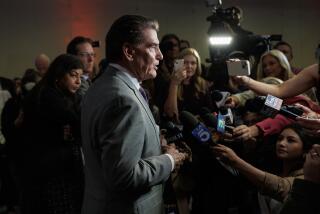Clinton Foundation donor excluded from the U.S. is not entitled to a hearing, government says
- Share via
Reporting from Washington — The federal government Thursday asked a court to throw out a lawsuit filed by a major Clinton Foundation donor who says he was damaged by what he said were improper government leaks to the Los Angeles Times.
Gilbert Chagoury, a billionaire Nigerian who gave at least $1 million to the foundation, said his reputation was damaged by disclosure of the government’s decision to deny him a visa to travel to the United States.
In court filings, Chagoury maintained that a Times report caused a bank to cancel his account and forced him to take a loss on the sale of his Beverly Hills mansion.
Chagoury, a philanthropist, Vatican ambassador and one of the richest men in Africa, was denied a visa in 2015 on suspicion that he had provided terrorism support. One FBI document, citing unverified information, claimed that Chagoury, who is of Lebanese descent, had funneled money to Hezbollah, a designated terror organization.
Chagoury adamantly denies providing money to any terror group. He has sued the FBI, State Department and other federal agencies, seeking a court hearing to rebut the claims.
“American justice demands due process, yet I still have been given no explanation for having my reputation dragged through the mud and no opportunity to rebut these falsehoods,” Chagoury said Thursday in a statement. “That is not the America I know and love. I deserve my day in court in order to clear my good name.”
But the Department of Justice said that Chagoury does not have standing to ask for a hearing. “Otherwise any alleged leak of sensitive or classified information, regardless of its truthfulness or accuracy, could trigger a name-clearing hearing,” the government said. “Such a result is not mandated by the Constitution.”
Chagoury’s case illustrates the difficulty of contesting decisions to deny visas, particularly on terrorism-related claims. Usually, customs officials do not detail the exact reasons for the denial. Those denied visas can ask for a waiver, but they usually have no right to contest the findings in court.
Twitter: @jtanfani
More to Read
Get the L.A. Times Politics newsletter
Deeply reported insights into legislation, politics and policy from Sacramento, Washington and beyond. In your inbox three times per week.
You may occasionally receive promotional content from the Los Angeles Times.









